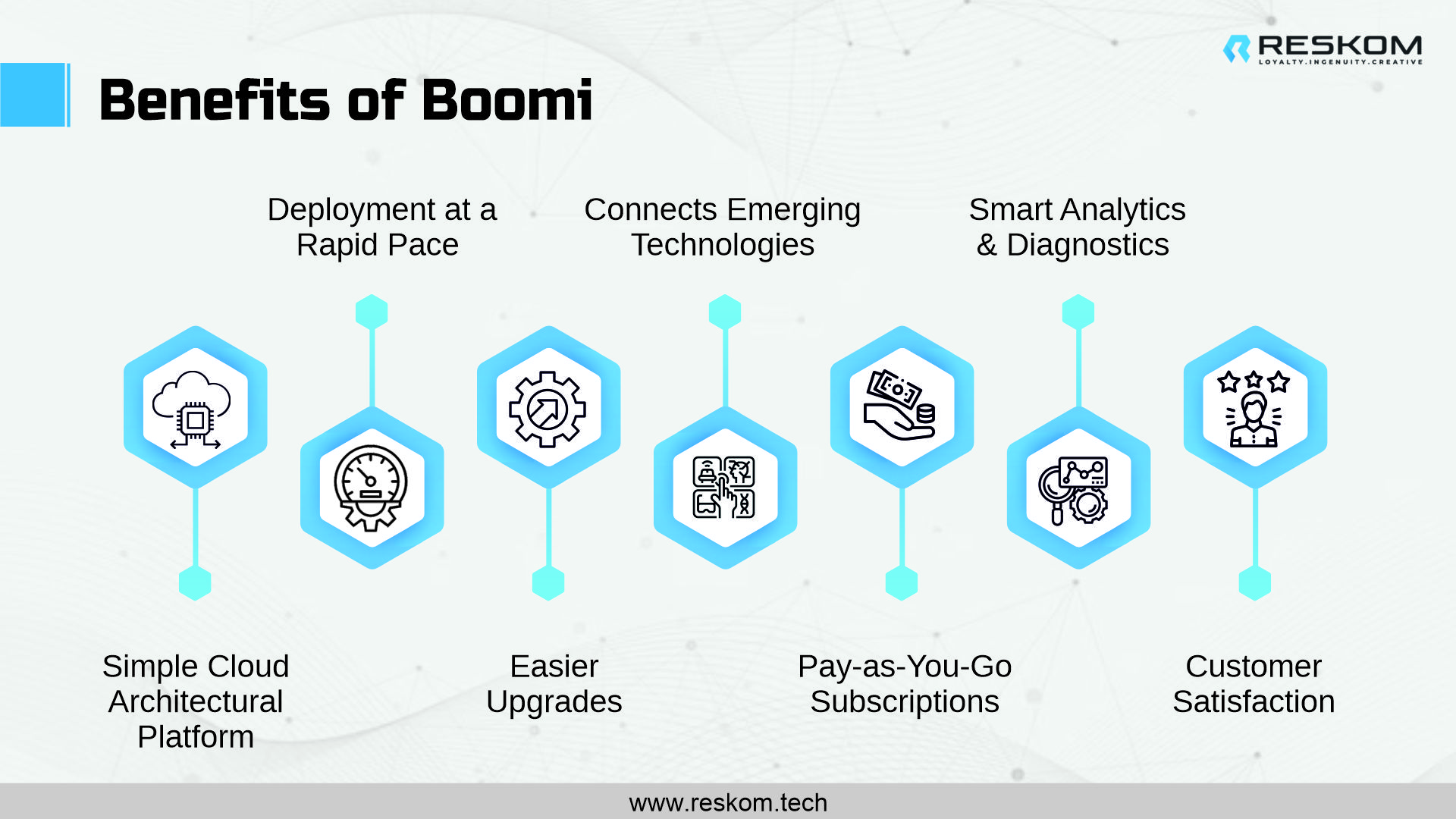Enterprises face the constant challenge of seamlessly integrating their applications and data across various platforms, both on-premise and in the cloud. Many organizations have relied on traditional Enterprise Service Bus (ESB) and legacy middleware solutions to meet their integration needs. However, these solutions often come with high maintenance costs, limited agility, and a struggle to keep up with the demands of hybrid IT environments.
If you find yourself in this situation, it’s time to consider a more efficient and cost-effective solution for your integration needs. Boomi, a cloud integration platform, offers a compelling alternative. Built on a multi-tenant architecture, Boomi provides scalable and agile integration between cloud, SaaS, and on-premise systems. In this blog, we’ll explore why Boomi is the right choice for your organization, focusing on its monitoring and Analytics in Cloud Integration capabilities.

Benefits of Boomi
Simple Cloud Architectural Platform
One of the primary challenges ESB users face is the complexity of integrating applications and databases across different environments. Traditional ESB solutions often struggle to provide easy access to all devices and applications, especially in a hybrid IT setup. This limitation restricts their integration capabilities to on-premise services only.
Boomi simplifies this complexity with its unified integration platform. It offers seamless access to every device and application, whether on-premise, in the cloud, or a combination of both. This means you can effortlessly move, manage, and govern data across your enterprise from a single platform. Boomi supports all combinations of integration between cloud, SaaS, and on-premise systems, eliminating the limitations of traditional ESB solutions.
Deployment at a Rapid Pace
The difference in deployment speed between Boomi and traditional ESB services is striking. Boomi eliminates the need for on-premise infrastructure, a task that often consumes significant time and effort. What’s more, Boomi’s user-friendly approach, featuring a drag-and-drop interface, simplifies integration without the necessity for coding. This streamlined process enables you to implement integrations within a matter of weeks, days, or even hours, ensuring your organization can swiftly adapt to evolving customer requirements.
Easier Upgrades
Upgrading software and applying bug patches can be a headache for IT departments, especially when dealing with on-premise hardware and complex installations. Boomi offers a cloud-native infrastructure that helps Analytics in Cloud Integration and simplifies the process. With no on-premise hardware involved, integrations can be updated immediately. Boomi automatically handles the installation of new software and bug patches, alleviating the burden on IT resources and ensuring a seamless experience with no issues during upgrades.
Connects Emerging Technologies
The tech sector’s innovation is being fueled by groundbreaking technologies such as machine learning and the Internet of Things (IoT). These technologies rely on machine-to-machine (M2M) communication to connect devices and facilitate seamless data transfer. However, traditional ESBs were not designed to efficiently accommodate these novel technologies.
Boomi, on the other hand, is specifically engineered to embrace and empower emerging technologies. Whether it’s IoT, machine learning, blockchain, or Analytics in Cloud Integration, Boomi is the ideal choice for businesses seeking to modernize their integration platform to embrace these cutting-edge advancements. Boomi excels in providing robust support for essential protocols like HTTP and MQTT, making it the perfect fit for organizations looking to stay at the forefront of technological innovation.
Pay-as-You-Go Subscriptions
Cost efficiency is a significant concern for enterprises, and traditional ESB solutions often come with high licensing and maintenance costs. Boomi offers a pay-as-you-go subscription model, allowing you to pay for the resources you need when you need them. There are no hidden or obscure costs, providing transparency and cost optimization for your organization. Boomi’s approach eliminates the need to maintain multiple instances, further reducing licensing costs compared to traditional ESB solutions.
Smart Analytics & Diagnostics
Effective monitoring and diagnostics are essential for maintaining a healthy integration environment. ESB users often grapple with complex integration setups that require external queuing applications for enhanced message-handling capabilities.
Boomi simplifies this with its smart Analytics in Cloud Integration and diagnostics features. Users have access to a dashboard view that enables them to monitor and manage data, integration processes, and Analytics in Cloud Integration from a single platform. Boomi’s application monitoring, diagnostics, and troubleshooting capabilities make it a robust and intelligent iPaaS platform, ensuring the smooth operation of your integrations.
Customer Satisfaction
At the heart of Boomi’s success is its commitment to customer satisfaction. With over 7000 large and midsize organizations as customers, Boomi has established itself as the preferred iPaaS vendor and a global leader in the cloud integration space. The company’s dedication to providing the best cloud services to its customers has solidified its reputation as a trusted partner for organizations seeking efficient and scalable integration solutions.
Conclusion
Efficient integration is the backbone of successful enterprises. Traditional ESB solutions may have served their purpose in the past, but they often come with limitations, high costs, and complexity that hinder an organization’s ability to adapt to evolving technology landscapes.
Boomi offers a compelling alternative with its cloud-native, multi-tenant architecture that simplifies integration, accelerates deployment, supports emerging technologies, and ensures cost efficiency. Boomi’s smart Analytics in Cloud Integration and diagnostics capabilities empower organizations to monitor and manage their integrations effectively, while its customer-centric approach has earned it a global reputation as the go-to cloud integration platform.


